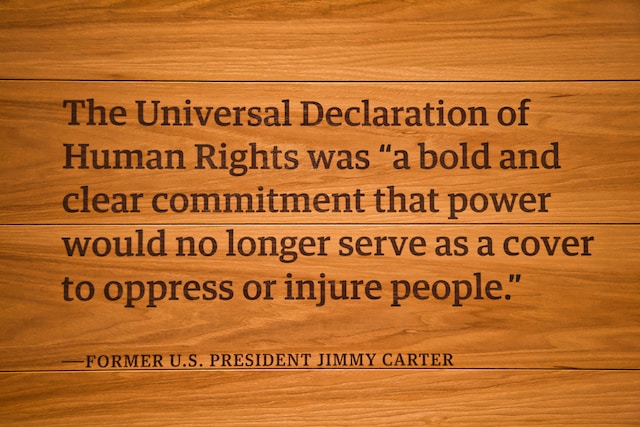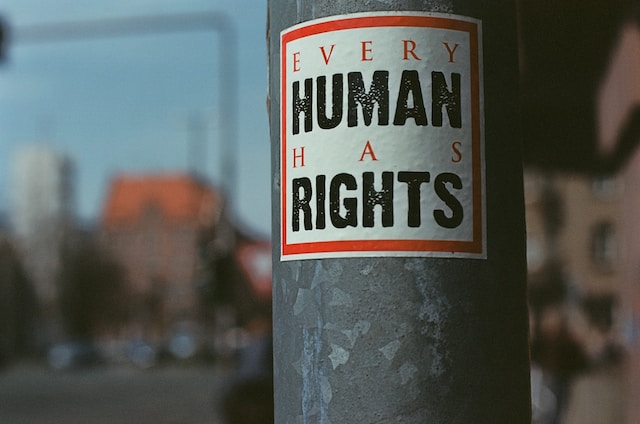Both human rights and civil rights are essential for protecting individuals from discrimination and ensuring equal treatment under the law. While civil rights are specific legal protections granted by a government to its citizens, human rights are universal and inherent to all people regardless of their nationality or citizenship status.
Civil Rights
(Photo by Unseen Histories on Unsplash )

Civil rights refer to the legal and social rights that every citizen is entitled to in a particular country. These are the rights granted by the government, which aim to provide equal treatment under the law regardless of race, gender, religion or any other personal characteristic.
The concept of civil rights has evolved over time with various landmark events shaping its trajectory. In America, for instance, civil rights movements have led to significant changes such as desegregation and voting reforms.
Civil Rights Act of 1964 was a crucial legislation that outlawed discrimination on basis of race, color, national origin or sex in schools and workplaces. This act paved way for affirmative action programs aimed at providing opportunities for minorities who were previously marginalized.
While civil rights have come a long way since their inception, there still remains room for improvement particularly when it comes to enforcing them equitably. As society continues to evolve so too should our understanding and application of civil rights laws.
Human Rights
(Photo by Chela B. on Unsplash )

Human rights are the basic rights and freedoms that belong to every person, regardless of their gender, race, nationality, or any other status. These rights are considered universal and inalienable because they cannot be taken away from individuals.
These rights include civil and political liberties like freedom of speech, religion, assembly, and association as well as economic and social rights such as access to education, healthcare services and employment opportunities. Human Rights also involve cultural aspects such as the right to participate in cultural life or enjoy artistic works.
A few examples of human rights violations include discrimination based on one’s age or beliefs; child labor; sexual harassment; gender-based violence; unequal pay for equal work; limited access to education or health care services among others.
The United Nations has established seven principles which form the basis for all human rights: universality (rights apply equally to all), interdependence (all human beings have multiple needs that must be met), indivisibility (civil-political & socio-economic-cultural-humanitarian-all must coexist), non-discrimination (everyone is entitled without distinction of race/color/sex/language/religion/political opinion) equality before law & due process/rights during trial/imprisonment/treatment under police custody); participation in decision-making involving public affairs by free elections/freedom of expression/receiving/giving information/assembling peacefully etc.),and accountability(meaning there should be protection mechanisms put in place so people can claim their violated right).
Human rights stand at a higher pedestal than any other legal system since it involves ensuring dignity, respect, and fulfillment of basic needs towards development, freedom, equality, political aspirations, cultural heritage among many others.
The promotion, at championing these fundamental pillars will undoubtedly lead us into a better world where everyone enjoys these vital values with no discrimination whatsoever.
Civil Rights vs. Human Rights – Key differences
While civil rights and human rights may sound similar, they have distinct differences. Civil rights are the legal protections and liberties granted to citizens by their government, whereas human rights extend beyond just the realm of citizenship.
Civil rights are typically focused on equality within a specific society or nation. This includes things like the right to vote, access to education and healthcare services, fair treatment in employment and housing opportunities, and protection from discrimination based on factors such as race, gender or religion.
On the other hand, human rights are universal principles that apply to all individuals regardless of where they live. These include basic necessities such as food, shelter and clean water; freedom from torture or slavery; free expression of beliefs; respect for privacy; protection against persecution for political views or identity groups; among others.
While civil rights focus on protecting individual freedoms within a particular country’s legal system, human rights set standards that all nations should strive towards upholding universally.
What are the basic human and civil rights?
Basic human and civil rights are fundamental rights that every person is entitled to by virtue of being human, regardless of their nationality, race, gender, religion, or any other status. These rights are usually guaranteed by law and protected by governments, and they include:
- The right to life: Every person has the right to life, and this includes protection from unlawful killings, arbitrary executions, and the death penalty.
- The right to liberty and security of person: Every person has the right to be free from arbitrary detention, imprisonment, or exile.
- The right to freedom of thought, conscience, and religion: Every person has the right to hold any belief, religion, or worldview without interference from the state or others.
- The right to freedom of expression: Every person has the right to express themselves freely without fear of censorship or reprisal.
- The right to peaceful assembly and association: Every person has the right to gather peacefully and form associations or groups without interference from the state or others.
- The right to participate in government: Every person has the right to participate in their government through voting, running for office, or advocating for policies.
- The right to equality before the law: Every person is entitled to equal protection under the law and equal treatment by government and the justice system, regardless of their race, gender, or other characteristics.
- The right to work and to fair wages: Every person has the right to work and to receive fair pay for their labor.
- The right to education: Every person has the right to education, which should be accessible and free from discrimination.
- The right to a healthy environment: Every person has the right to live in a clean and healthy environment, free from pollution and other harmful activities.
What is the difference between civil rights and freedom?
Civil rights and freedom are often used interchangeably. However, they have some key differences. Civil rights refer to the legal protections granted to individuals by their government in order to ensure that all members of society receive equal treatment under the law. These may include voting rights, access to education, housing, and employment opportunities.
On the other hand, freedom refers to an individual’s ability to act without interference from others or from the state. Freedom can be viewed as a broader concept than civil rights because it encompasses not only legal protections but also personal autonomy and self-determination.
While civil rights focus on ensuring equality for everyone within a society through laws and policies, freedom is more about empowering individuals with choices regarding how they live their lives. For example, while a person may have the right to vote (a civil right), they may not necessarily have complete freedom if there are barriers preventing them from exercising this right such as voter suppression tactics.
While both concepts are related and overlap in many ways, understanding the distinction between civil rights and freedom is important for fostering greater social justice and individual empowerment within our communities.
What are the 7 principles of human rights?
The 7 principles of human rights are the fundamental values that underpin all human rights. These principles include universality, inalienability, indivisibility, equality and non-discrimination, participation and inclusion, accountability and rule of law.
Universality means that human rights apply to everyone regardless of their nationality or any other status such as race, gender or religion.
Inalienability means that no one can take away your human rights. They belong to you simply because you are a human being.
Indivisibility means that all human rights are interconnected and interdependent. None can be fully enjoyed if others are not respected.
Equality and non-discrimination mean that every person is equal before the law regardless of their background or identity.
Participation and inclusion require governments to involve individuals in decision-making processes affecting their lives.
Accountability ensures those responsible for violating these basic freedoms must be held accountable for their actions while respect for the rule of law demands justice must always prevail over impunity.
Understanding these seven key principles helps us understand what constitutes a violation of our basic freedoms as humans so we can defend ourselves appropriately when they’re threatened or violated by anyone including states themselves.
Featured Image By – Markus Spiske on Unsplash








